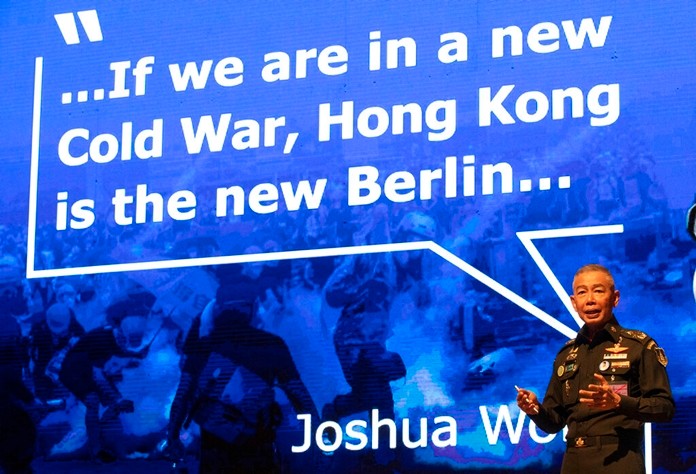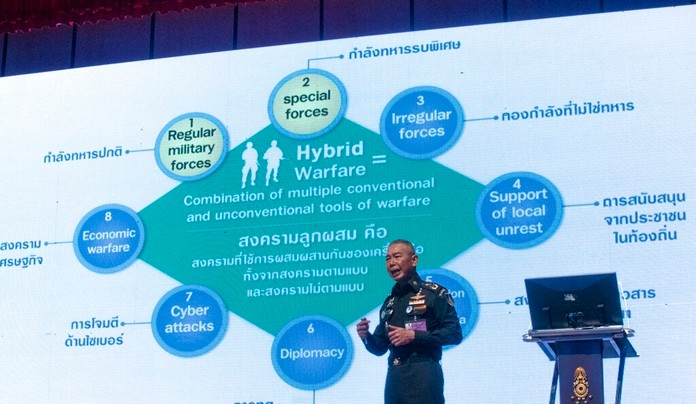
Bangkok (AP) — Thailand’s powerful army chief declared Friday that the country’s government is virtually at war with its critics, warning that politicians, academics and other intellectuals may “manipulate” young people to stage protests like those in Hong Kong.
Gen. Apirat Kongsompong in a prepared speech to an audience at army headquarters charged that “hybrid warfare” incorporating methods such as online propaganda and more traditional violent means was already being employed in Thailand to destroy the nation.
It was unclear exactly what he was referring to because Thailand is not at war, the military and its allies are firmly in charge having run the country for the past five years, and a long-running insurgency is limited to the nation’s three southernmost provinces. Apirat’s comments appeared largely aimed at opposition politicians who campaigned on efforts to reform the military but have not advocated war or violence.
Nevertheless, and he said the politicians were linked to former communists who he said never gave up efforts to seize power and were still trying to destabilize the country. He didn’t identify the politicians by name, but the context of his remarks made it clear he was including Thanathorn Juangroongruangkit, the head of the Future Forward Party.
The upstart Future Forward Party did surprisingly well in the election, especially among young people and others in agreement with its criticism of the military’s involvement in politics, and is now the third biggest in parliament. That puts it at odds with Thailand’s traditional ruling establishment, which is centered around the military.
Apirat is known as a staunch nationalist and royalist, and at least once Friday appeared to be in tears when speaking of King Maha Vajiralongkorn.
In his speech and a supporting slideshow, Apirat tried to tie together all the stands of government opponents into one vast conspiracy. His major target appeared to be Thanathorn.
Thanathorn recently posted a photo on his Facebook page of him standing with leading Hong Kong dissident Joshua Wong, drawing a rebuke Thursday from the Chinese Embassy in Thailand. A statement from the embassy said some Thai politicians — not identified by name — had contacted “separatists” in Hong Kong in a supportive manner, an action the embassy decried as wrong and irresponsible.
Apirat echoed the Chinese line that protesters in Hong Kong were being used by outside powers. Speaking rhetorically, Apirat questioned whether Thai students in the audience could be manipulated by “social media and propaganda” into taking to the streets.
A slide projected during his speech showed the photo of Thanathorn with Wong, but with Thanathorn’s figure greyed out. Apirat pondered out loud whether the politician had conspired with Wong.
Thanathorn in a Facebook posting after Apirat’s speech said he only posed for a photo with Wong at a seminar and did not support Hong Kong separatism.
Apirat’s references to communists could have been about former Prime Minister Thaksin Shinawatra, who took office in 2001 and had some top aides who had been in the jungle with the Communist Party of Thailand in the 1970s. They had fled there after an army-backed massacre of students at a university in Bangkok set up a coup against an elected government.

Thaksin’s popularity and authoritarian tendencies rattled the Thai establishment and he was ousted in the 2006 coup. Rather than a communist, Thaksin was a telecommunications billionaire who at the time of his election was one of the country’s richest men.
Thanathron is also a businessman and ran his family’s auto parts empire before entering politics for the first time during the last election.
Apirat’s speech had been billed in advance as being about the situation in Thailand’s deep south, home to a Muslim separatist insurgency.
 |
 |
 |





